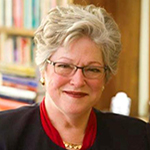By Molly Marshall
 Seminaries are in the news these days as the church continues to shift in social location in our communities. Theological education, in my judgment, can be a source of renewal for congregational life, and it may be the only place devoted to preserving and developing Christian theological identity in postmodernity. I am biased, of course, for this is my life’s work — since shortly after the earth cooled!
Seminaries are in the news these days as the church continues to shift in social location in our communities. Theological education, in my judgment, can be a source of renewal for congregational life, and it may be the only place devoted to preserving and developing Christian theological identity in postmodernity. I am biased, of course, for this is my life’s work — since shortly after the earth cooled!
If churches are in precipitous decline, as many suggest, then there will not be the necessity of seminary education, with its freight of educational debt. Indeed, a critical question may be “can the church and the minister afford each other?” Compensation patterns in most churches do not allow ministers to discharge educational debt quickly; negligible stewardship among too many congregants makes the calculus more daunting, but I digress.
Churches are in decline where there is a self-preserving mentality, and few are interested in helping patch a listing ship. Churches are in decline when there is not a clear message of what they are for, not simply what they are against. Churches are in decline when they are invisible in situations where moral courage is needed. Churches are in decline when they resist adaptive change, which could make gospel witness more winsome.
I do not believe decline is inevitable; rather, I staunchly believe that this season of reflecting on the church’s mission is healthy and promising. Indeed, it might be helpful to remind ourselves that more than the church having a mission, God has a church to use in the divine missio Dei. A disposition of humility in this can make us much more useful in the divine purpose.
As I write, I am in Myanmar for a doctor of ministry seminar at the Myanmar Institute of Theology, a regular pilgrimage for me in the spring. Meeting with faculty I hear echoes of some of the same notes as at home. Graduates leave the seminary with high hopes of doing the contextual theological work that will move congregations beyond the inherited patterns of the missionaries. When they get to the churches, and they attempt to change the music, reorder the liturgy, engage their communities, or transform the role of the pastors, deacons, or laypersons, resistance ensues. Because ordination may take a number of years, some do not move into the roles for which they prepared. And the church forfeits visionary leadership.
Many faculty members here write about the need to let the cultural forms of Myanmar be the focus for the expression of Christian discipleship, letting go of the transplanted western worship practices. Yet, when I visit the churches I hear hymns from the 19th century. I cannot remember the last time I sang “Count Your Blessings,” “For I Know Whom I Have Believed” and the requisite threefold amen following the benediction. Actually, I do remember. It was last year when I worshipped here.
Faculty wonder if they did not teach their students sufficiently, and churches wonder why they should support seminaries that do not replicate embedded practices. Graduates get discouraged about the process of change, perhaps because they lack leadership skill to bring about the incremental shifts that would make the church more relevant. The necessary partnership between seminary and church breaks down, and churches remain mired in alien or irrelevant expressions of Christian identity. And I am not just talking about Myanmar.
This persistent reality suggests to me that what may be needed in seminary — in addition to theology, biblical studies and the arts of ministry — is even more focused attention to the process of leading change. Leaders of change are characterized by a stubborn optimism that change can occur, that the church is a dynamic organism, that theological insights are not inert and that people can be inspired toward transformation (with the exception of a few old soreheads).
Leaders of change realize that stasis means death, and that coasting inevitably means a downward trajectory. Leaders model and live into the change ahead of the structure they seek to shape; they also learn to build coalitions that will welcome new horizons for ministry. Leaders can empower congregations to move with confidence and joy into God’s future.
Seminary graduates are a treasure to the church. Churches have formed them and encouraged them to pursue theological education, and when they welcome them back in their home or other congregations, it should be with the same openness that faculty desire in their students. Churches should not recommend students to attend seminary if they do not want them to grow and change. Graduates bring energy and fresh eyes to the responsibilities of ministry.
I believe that the gap between classroom and congregation can be bridged, and the relationships of seminaries, graduates and churches can be an alliance that serves the respective interests of each. There is understandable tension between embedded ways and new challenges, but not insurmountable. We need each other, and our participation in God’s redemptive mission depends upon strengthened partnership.
